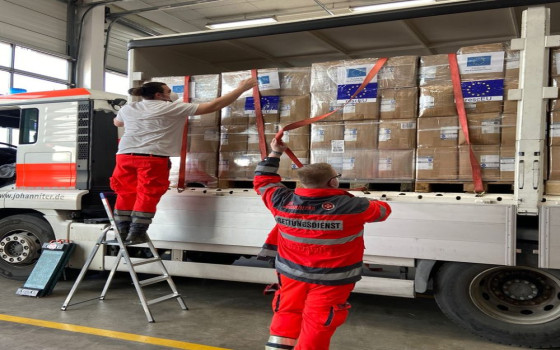
month after the European-Israeli agreement to increase aid deliveries to Gaza, some areas have crossed the threshold of famine. Opposition to sanctions continues.

- Europe and Arabs
- Wednesday , 6 August 2025 9:48 AM GMT
Brussels: Europe and the Arabs
It has been almost a month since Kaya Kallas, the European Union's top diplomat, agreed on a plan with Israel to increase aid deliveries to Gaza. The agreement was supposed to see an expansion of daily truck deliveries of food, fuel, and other essential supplies, along with the opening of more roads for aid, and improved distribution through a network of bakeries and public kitchens.
Since then, aid agencies, national governments, and the European Union itself have warned of widespread famine in Gaza, a claim Israel denies, and one that Europe and the United States appear unable or unwilling to stop. According to Playbook, the European version of Politico magazine, the report adds, "The European External Action Service (EEAS) is scheduled to present its assessment of Israel's compliance with its side of the agreement to EU member states. The verdict is expected to be distributed to EU diplomats today, and, to put it mildly, it seems unlikely to conclude with significant improvement on the ground.
The report will be based on figures from the United Nations and aid agencies operating in the region, among other data. The Commission uses the Integrated Food Security Phase Classification (IPC) as the primary reference for determining the severity of the crisis.
The IPC, supported by bodies such as the United Nations, the World Health Organization, and several aid agencies, warned on July 29 that "a worst-case scenario of famine is currently unfolding in the Gaza Strip." Conflict and displacement have intensified, and access to food and other essential goods and services has declined to unprecedented levels. An updated Integrated Food Security Phase Classification report is expected in mid-month, but the Commission has already indicated that some areas have crossed the threshold of famine.
The European Commission itself cannot enter Gaza to conduct a thorough assessment. Last month, Israeli authorities denied entry to Maciej Popowski, head of the Directorate-General for Humanitarian Aid and Civil Protection (ECHO), who was visiting the region. According to an official, Commissioner for Crisis Response, Haja Lahbib, is ready to board a plane to see what is happening on the ground, but is continually refused entry. Brussels is escalating its warnings: “The scale of human suffering in Gaza is devastating,” Lahbib wrote on the X website this week, again calling on Hamas to release all Israeli hostages and on Israel to “end the starvation of Gaza” and allow aid into Gaza “on a large scale.” Commission Vice-President Teresa Ribera intervened on Tuesday to criticize Israel for its “horrific use of violence and starvation.” She described the proposal as a “proposal.” Prime Minister Benjamin Netanyahu has described the full occupation of Gaza as an "unacceptable provocation."
Trump shrugs it off: When US President Donald Trump was asked last night whether he would support a full Israeli occupation of Gaza, he told reporters, "That's largely up to Israel."
So what will Europe do about all this? The answer is: nothing significant at the EU level, at least for now. Just over a week ago, the European Commission proposed what many saw as a mild slap on the wrist for Israel: suspending research and development cooperation for certain dual-use projects (civilian or military) under the Horizon Europe program.
Even this proposal did not receive the support of a qualified majority of EU member states, with Germany and Italy being the most prominent abstainers. This undermines Brussels' credibility.
Diplomats on alert: EU envoys spending the summer in Brussels are set to meet in a few hours to reconsider the suspension of this part of the Association Agreement with Israel. But realistically, this will only happen if German leader Friedrich Merz drops his opposition. To punish Israel.
The public mood is changing, including in Berlin. According to diplomats and EU officials, the message from Germany was that Merz hoped that a signal to Israel through the threat to suspend parts of the Horizon program would be enough to push Netanyahu to change course. This approach appears to have failed, prompting some to reconsider. On Tuesday, Belgium joined the countries that have publicly declared their support for punishing Israel through Horizon measures.
Take tougher action: Playbook notes growing calls, including from within Ursula von der Leyen's team of EU commissioners, for tougher action, including suspending vital trade ties with Israel, a move that would certainly attract attention.
MEPs break genocide taboo
The word "genocide": Leaders of the Socialists, Left, and Greens in the European Parliament have joined forces to sign a joint letter accusing Israel of "genocide." The letter, seen by Politico, is addressed to von der Leyen and Kallas. and European Council President António Costa, calling for a more rapid response from the EU as a whole.
"This situation can no longer be considered a mere emergency: there is clear evidence of genocide in Gaza," the letter read. "The European Commission and the European Council have so far failed to respond with the speed and resolve required by our treaties, values, and responsibilities."
Others in Brussels see parallels with past genocides. "We are witnessing a deliberate, man-made starvation in Gaza," an EU official told Playbook. During the 1990s in Rwanda and Bosnia, world powers justified their slow responses to unfolding disasters by saying they were not sufficiently informed to intervene. "This time, we cannot say that."












No Comments Found